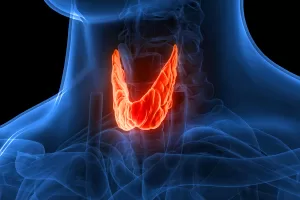We know the basics of weight management, right? Balance the number of calories you consume with your energy needs and the number on your scale will be consistent. In this regard, one can stumble into two terms, often used interchangeably but they are not quite the same:
- BMR, or basal metabolic rate, is the energy your body needs to support life in it: to breathe, digest food, pump blood through vessels, maintain homeostasis, etc.
- REE, or resting energy expenditure, is the amount of calories you burn while being at rest or engaging in very light basic activities, such as walking or eating. Therefore, REE better reflects your energy needs for an average peaceful, if a bit lazy, day.
So, one’s preferred daily amount of calories is roughly their REE plus the amount spent for activities, such as work and sports. But if a person gains weight no matter how well-thought-out is their nutrition plan, there might be something off with their endocrine system. For example, weight gain is one of the signs of thyroid issues.
What is Thyroid
A thyroid gland is a little organ that has a butterfly-like shape. It is located in front of your neck. The thyroid gland produces hormones that control a lot of body functions, such as:
- metabolism;
- energy levels;
- mental operation, emotions, cognition;
- heart rate;
- digestion;
- maintenance of bones and skin;
- breathing;
- body temperature;
- fertility.
The organ is a part of the hypothalamic-pituitary-thyroid axis (HPT). The hypothalamus produces thyrotropin-releasing hormone (TRH) that triggers the pituitary gland to release thyroid-stimulating hormone (TSH). TSH triggers the production of thyroid hormones, T3 (triiodothyronine) and T4 (thyroxine).
Thyroid Disorders
A thyroid disorder is a health condition when the gland does not produce a proper amount of hormones. Its function can be excessive or insufficient, both cases having a significant impact on a person’s well-being. If a healthcare practitioner suspects a thyroid disease, they order specific screening, such as blood tests to measure thyroid hormone levels and an ultrasound to have a look at the organ.
Hypothyroidism
When the thyroid produces not enough hormones, the condition is known as hypothyroidism. It can happen because of:
- birth defects;
- iodine deficiency (our organism uses iodine to produce thyroid hormones);
- bad genetics (in a family with a history of thyroid disorders, a person is more prone to developing one);
- thyroiditis (inflammation in the gland);
- autoimmune condition (when the body attacks the thyroid with antibodies: it is called Hashimoto’s thyroiditis;
- surgical intrusion (for example, if the organ was partially or fully removed due to cancerous processes; the operation of thyroid removal is called thyroidectomy).
Hypothyroidism shows itself with a variety of symptoms, such as depression, fatigue, anemia, dry skin, slow movement, constipation, and weight gain.
Hyperthyroidism
Hyperthyroidism is an opposite condition: the thyroid releases too much hormones. Its common causes include:
- Grave’s disease: a condition that causes 70% of hyperthyroidism. It is an autoimmune condition that makes the thyroid overactive.
- nodules: non-cancerous tissue formations in the thyroid gland.
- iodine overconsumption.
An overactive thyroid can cause hyperactivity, skin dampness, diarrhea, anxiety, and weight loss.
How Thyroid Disorders Cause Weight Gain
Thyroid issues have a clinically established link to weight gain. The increase in body weight occurs due to several reasons:
- Thyroid hormones affect metabolism and the way organism spends energy;
- Thyroid disorders cause fatigue which makes a person less physically active;
- Depression caused by thyroid issues can changes eating habits and cause overeating.
We mentioned weight gain with an underactive thyroid. It is more common because thyroid hormone deficiency slows down metabolism and decreases BMR. This is why weight gain after thyroid surgery is so common, for instance: surgical intrusion causes hypothyroidism which, in turn, leads to increased body mass.
However, an indirect impact can also occur. With an overactive thyroid, a person is more likely to lose weight due to increased metabolism and BMR. But after treatment, when the eating habits stay the same and hormone levels drop back to normal, weight gain is more than likely.
Weight Gain Patterns in Thyroid Disorders
Weight gain after thyroid ablation or another case of hypothyroidism is not so drastic. On average, a patient can gain 5 to 10 pounds of excessive weight, mostly through water and salt accumulation. After treatment, weight loss can reach up to 10% of total body weight.
With hyperthyroidism, the pattern is different. A 2018 study observed weight changes in individuals who were undergoing anti-thyroid treatment. The participant demonstrated increased weight in the first 2 months, then plateaued (2–6 months), after which their weight gradually decreased (24–52 weeks). If the initial period showed an increase in fat mass, later the volunteers had less fat, increased lean mass, and stronger muscles.
Management of Weight Gain
So, in the event of weight gain after thyroid removal or otherwise underactive thyroid, what are the patient’s options?
Medical treatment
If you experienced other symptoms that could mean a thyroid disorder, besides weight gain, and a blood test revealed an abnormality in your thyroid hormone levels, then a specific treatment plan is absolutely necessary and will benefit you a lot.
Insufficient thyroid function is managed through synthetic thyroid hormones, such as levothyroxine. Overactive thyroid requires anti-thyroid therapy with medication such as thiamazole or radioactive iodine.
Dietary changes
You need to ensure that your diet is healthy, provides all the necessary nutrients, and is not overloaded with undesirable things, such as sugar or processed foods. It is also necessary to review your calorie intake to ensure it is optimal for your current metabolism and desirable effect on your body weight. A nutrition specialist can guide you if needed.
Summary
Weight gain can be caused by a thyroid disorder; primarily because thyroid hormones are heavily involved in our metabolism. If the person persistently gains body mass and experiences other signs of a thyroid disorder, we advise them to consult a healthcare provider for screening, diagnosis, and proper treatment.
FAQ
Can thyroid problems cause you to gain weight?
Yes: a thyroid disease changes metabolism and BMR; increased body weight is common for hypothyroidism.
How do you fix thyroid weight gain?
Hormone levels can be managed through dedicated medication; reviewed dietary plan helps to balance the calorie and nutrient intake.
How much weight do you gain with thyroid problems?
t is individual and depends on other conditions; a person’s eating habits, and the severity of the condition.
How much weight gain in hypothyroidism?
The average amount is 5–10 pounds.
Is my thyroid making me gain weight?
It is possible; however, you should not assume it by yourself. Consult your doctor for a physical exam and screening to establish an accurate diagnosis.




